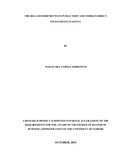| dc.description.abstract | Public debt is one of the main macroeconomic indicators, which forms countries’ image
in international markets. Public debt remains one of the major economic policy issues
confronting the governments of poor countries globally because the debt levels. Debt
sourced finance represents funds with fixed contractual obligations which will require
pledging future resources of the nation as collateral. This study sought to establish the
relationship between public debt and foreign direct investments in Kenya. Descriptive
research design was used as it seeks to explain the the relationship between public debt
and foreign direct investments in Kenya. Secondary data was used for analysis. Data
collected was analyzed using descriptive measures of central tendency including means,
standard deviation, skewness, kurtosis, and the multiple regression analysis. The study
findings revealed that a relationship exists between foreign debt and domestic debt and
the foreign direct investment in the study period as shown by the model summary. A
positive relationship was observed between foreign debt and FDI. Domestic debt also had
a positive impact on FDI as indicated by the positive beta co-efficient with FDI. Foreign
debt had the greatest influence on FDI as shown by the high beta co-efficient. The
variable was the second in influencing FDI in the country in the study period. Domestic
debt had a moderately strong co-relation with the FDI. These findings therefore
warranted that the study variables had an effect on FDI. The regression results further
indicated that the relationships were significant since all the significance values were less
than the preset significance. The GDP however had the least influence on the FDI as
indicated by the small beta co-efficient. Consequently, the GDP had a weak positive corelation
with FDI. Therefore, GDP has a positive impact on the FDI levels in the country.
The independent variables in the study were significant since their significance values
were less than the preset significance level. The findings recommend that the government
policy makers need to push reform agenda on public debt so as to attract more FDI in the
Kenyan economy since a higher investor’s confidence in domestic market acts as a
stimulus in attracting FDI inflows. | en_US |

